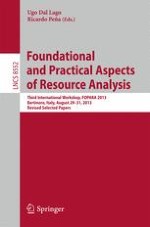2014 | Buch
Foundational and Practical Aspects of Resource Analysis
Third International Workshop, FOPARA 2013, Bertinoro, Italy, August 29-31, 2013, Revised Selected Papers
herausgegeben von: Ugo Dal Lago, Ricardo Peña
Verlag: Springer International Publishing
Buchreihe : Lecture Notes in Computer Science
